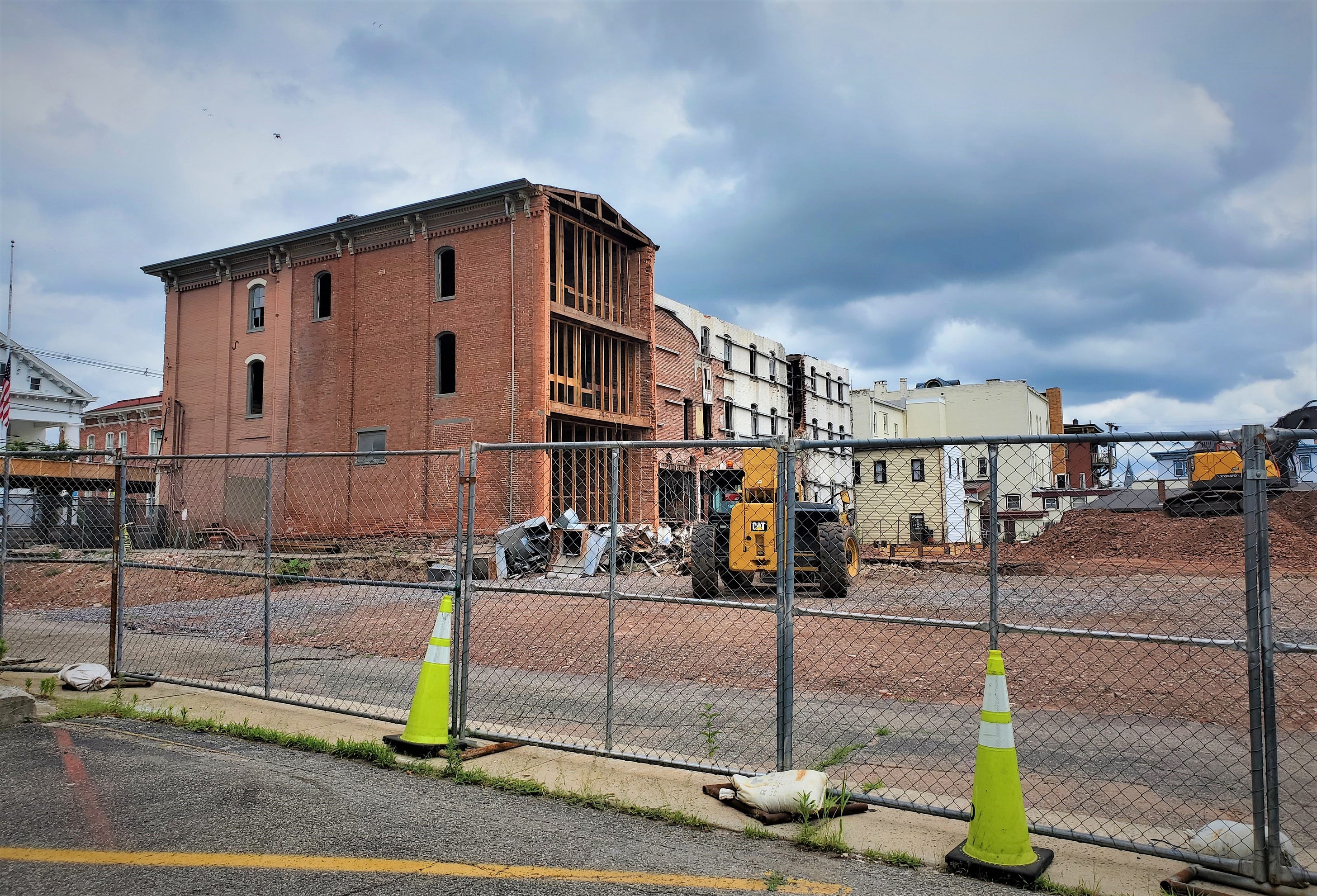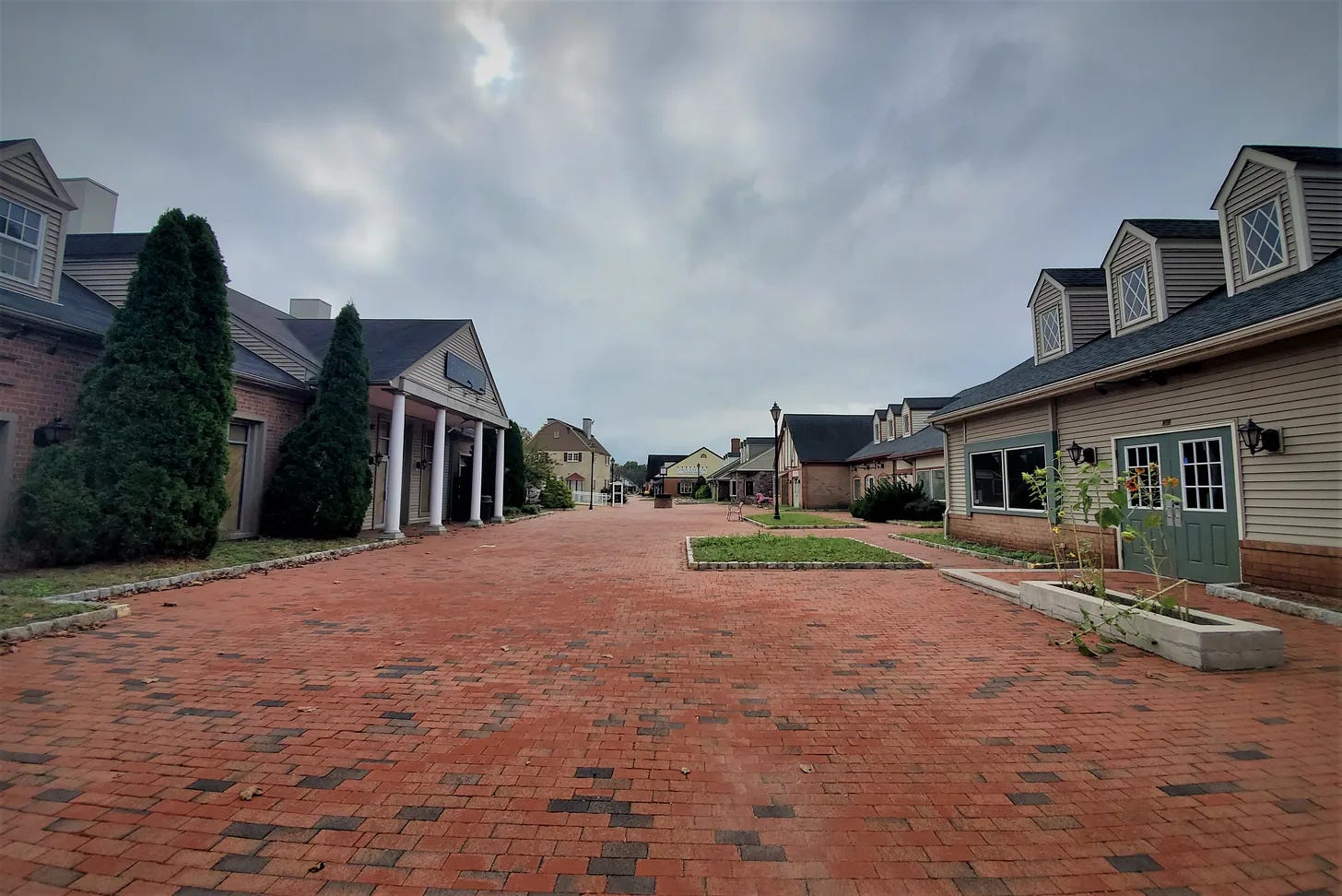The Deleted Scenes - The Essence of Home
I had a personal essay in The Bulwark last week about my hometown of Flemington, New Jersey, and how a couple of big development projects in town have made me more excited to come visit, and rekindled my sense of it being home. It’s titled “NIMBYism is a Distorted Love.” There’s a lot going on here. Some of it is similar to ground I covered in this piece here at my newsletter from last year, inspired by a different visit to my hometown and to my best friend’s house. But here, I’ve done more than reminisce about my childhood or just disagree with the NIMBYism that defined development politics in Flemington and the surrounding area for most of my life. I tried to really put into words why, exactly, change doesn’t upset me, even as someone who loved Flemington as a kid, and has a lot of nostalgia for that period in its life. I don’t see myself as just elevating some abstraction of “change” and “growth” over the on-the-ground reality of the place, or imposing my idea of the good life. Rather, I see some degree of change as evidence of life. Not for nothing do I use the term “encased in amber” a lot in reference to overly restrictive zoning, and not for nothing do urbanists sometimes talk about “the embalmed city.” So there’s something new here, as my thoughts about stability and place versus change and growth have crystalized. I think this is the crux of it:
As I wrote on Monday, people talk about developers as if they have some nefarious agenda, as if giving in a little bit is giving away the farm, or as if the demand for housing in a place like this is so intense that it will completely remake everything. And yet at the same time, people seem surprised that anybody wants to live here at all. “I love this town, why would anyone want to move here?” I said rhetorically to a business owner on Main Street I know, who is also enthusiastic about the projects coming to town. He nodded as if he heard that before. I understand the idea that preserving the town as-is would “dishonor” its founders sounds a little flippant, maybe. But what brought me to that sentiment was actually learning about the town’s history, and feeling this really neat feeling, difficult to put into words, that this place has been so many different things for so many different people, long before my experience of it:
Gray was talking about older folks in extremely expensive neighborhoods that were once middle class, and how these older residents will wonder why, for example, their children are leaving, and they feel lonely and isolated in their retirement years. “Their community has been destroyed by not allowing the built environment to change,” he said.
Change—to some extent, depending on so many factors—is, I conclude, the heartbeat of places that are alive. There’s a lot of Strong Towns influence here; I argue that the compromise is not no change or huge top-down projects, but rather a fundamental devolution of scale: squeezing out the dynamic of stagnation punctuated by huge projects, and replacing it with that heartbeat of distributed, small-scale, incremental change. The projects in Flemington are bigger than many Strong Towns folks might like, but I believe them to be basically the best possible projects you could have gotten given the conditions right now. The most notable one, on Main Street, involves restoring the iconic Union Hotel and another brick structure next door, demolishing a badly decayed wood-frame structure, and putting in apartments and retail in the back. This has been paired with rolling back Main Street’s parking-minimum requirement in the zoning code, making it easier and less expensive for small businesses to open up shop. Here’s the back of that worksite: The other big project involves a total redevelopment of the mostly abandoned Liberty Village outlet center. I can still remember seeing signs on the way into New York City advertising Liberty Village. People came from all over to shop and stay overnight. But there just isn’t much you can do with that property incrementally. It was once bustling with stores and funneled people into Main Street, but now it’s a hole in the street grid and a dead space, and the new housing planned for the space will fix that. Currently, it looks like this: Flemington’s mayor told me that she was herself a fan of Strong Towns, and she wished more incremental and fine-grained development were possible. But zoning is only one part of that. Another big part is financing (although big players in town, she suggested, might be interested in financing smaller enterprises.) The biggest barrier though, she said, was finding people who actually wanted to knock down a wall to double a storefront, or build a third floor, or do some other small-scale incremental mini-project of the sort that once defined and built urban landscapes. My phone lines are open, she said; the small-scale incremental developers are not calling. All of this is really complicated. My ultimate feeling is that we can’t make the perfect the enemy of the good. A couple of carefully hammered out big projects can provide the sense of being on the upswing that attracts entrepreneurs and small developers. My understanding is that Flemington is already seeing that. Somerville, the county seat of neighboring Somerset County, saw that dynamic too. There, the local government sold new housing and mixed-use development with a simple but basically irrefutable argument: you can’t have a vibrant downtown without people. These little towns mostly no longer have their own local industry to power a small local economy. They mostly no longer have something like Liberty Village, that brings in the needed people from the outside. Today, with the national economic and development climate we have right now, vitality has to come from the inside. I would rather see my hometown alive than preserved exactly as I remember it. I think more people are good, because I think people are good. If I had not stumbled across urbanism five years ago, I would have inherited suburban NIMBYism. I would still be saying, as I remember saying in high school, that the people running Flemington’s large projects (that’s how long they’ve been under discussion) want to destroy the town. I don’t, obviously, think that any more, and this essay is probably my best attempt to articulate exactly why. Read the whole thing! Related Reading: Pennsylvania’s Unique Housing Crisis Thank you for reading! Please consider upgrading to a paid subscription to help support this newsletter. You’ll get a weekly subscribers-only post, plus full access to the archive: over 400 posts and growing. And you’ll help ensure more material like this! You’re a free subscriber to The Deleted Scenes. For the full experience, become a paid subscriber. |
Older messages
Driving Responsibility
Saturday, July 23, 2022
Thoughts on Ross Douthat's driving essay, and more
New and Old #67
Friday, July 22, 2022
Friday roundup and commentary
Growing Up
Thursday, July 21, 2022
Experiencing childhood from the other side
Fusion in a Jiffy
Wednesday, July 20, 2022
What Do You Think You're Looking At? #67
Unlimited Food for Thought
Tuesday, July 19, 2022
More on all-you-can-eat buffets
You Might Also Like
Reacher. Is. Back. And Alan Ritchson's Star is STILL Rising
Sunday, March 9, 2025
View in Browser Men's Health SHOP MVP EXCLUSIVES SUBSCRIBE THIS WEEK'S MUST-READ Reacher. Is. Back. and Alan Ritchson's Star is STILL Rising. Reacher. Is. Back. and Alan Ritchson's Star
12 Charming Movies to Watch This Spring
Sunday, March 9, 2025
The sun is shining, the tank is clean – it's time to watch some movies ͏ ͏ ͏ ͏ ͏ ͏ ͏ ͏ ͏ ͏ ͏ ͏ ͏ ͏ ͏ ͏ ͏ ͏ ͏ ͏ ͏ ͏ ͏ ͏ ͏ ͏ ͏ ͏ ͏ ͏ ͏ ͏ ͏ ͏ ͏ ͏ ͏ ͏ ͏ ͏ ͏ ͏ ͏ ͏ ͏ ͏ ͏ ͏ ͏ ͏ ͏ ͏ ͏ ͏ ͏ ͏ ͏ ͏ ͏ ͏ ͏ ͏ ͏
10 Ways to Quiet Annoying Household Noises
Sunday, March 9, 2025
Digg Is Coming Back (Sort Of). Sometimes the that's noise bothering you is coming from inside the house. Not displaying correctly? View this newsletter online. TODAY'S FEATURED STORY 10 Ways to
The Weekly Wrap # 203
Sunday, March 9, 2025
03.09.2025 ͏ ͏ ͏ ͏ ͏ ͏ ͏ ͏ ͏ ͏ ͏ ͏ ͏ ͏ ͏ ͏ ͏ ͏ ͏ ͏ ͏ ͏ ͏ ͏ ͏ ͏ ͏ ͏ ͏ ͏ ͏ ͏ ͏ ͏ ͏ ͏ ͏ ͏ ͏ ͏ ͏ ͏ ͏ ͏ ͏ ͏ ͏ ͏ ͏ ͏ ͏ ͏ ͏ ͏ ͏ ͏ ͏ ͏ ͏ ͏ ͏ ͏ ͏ ͏ ͏ ͏ ͏ ͏ ͏ ͏ ͏ ͏ ͏ ͏ ͏ ͏ ͏ ͏ ͏ ͏ ͏ ͏ ͏ ͏ ͏ ͏ ͏ ͏ ͏ ͏ ͏ ͏ ͏ ͏ ͏
Weekend: Introducing the Butt Mullet Dress 👀
Sunday, March 9, 2025
— Check out what we Skimm'd for you today March 9, 2025 Subscribe Read in browser Header Image But first: Join the waitlist for a new premium Skimm experience Update location or View forecast
Starting Thursday: Rediscover Inspiration Through Wordsworth
Sunday, March 9, 2025
Last chance to register for our next literary seminar starting March 13. March Literary Seminar: Timothy Donnelly on William Wordsworth Rediscover one of the most influential poets of all time with
5 little treats for these strange and uncertain times
Sunday, March 9, 2025
Little treat culture? In this economy?
RI#266 - Down the rabbit hole/ What is "feels-like" temp/ Realtime voice tutor
Sunday, March 9, 2025
Hello again! My name is Alex and every week I share with you the 5 most useful links for self-improvement and productivity that I have found on the web. ---------------------------------------- You are
Chaos Theory: How Trump is Destroying the Economy
Sunday, March 9, 2025
Trump's erratic, chaotic governing style is dragging down the economy ͏ ͏ ͏ ͏ ͏ ͏ ͏ ͏ ͏ ͏ ͏ ͏ ͏ ͏ ͏ ͏ ͏ ͏ ͏ ͏ ͏ ͏ ͏ ͏ ͏ ͏ ͏ ͏ ͏ ͏ ͏ ͏ ͏ ͏ ͏ ͏ ͏ ͏ ͏ ͏ ͏ ͏ ͏ ͏ ͏ ͏ ͏ ͏ ͏ ͏ ͏ ͏ ͏ ͏ ͏ ͏ ͏ ͏ ͏ ͏ ͏ ͏ ͏ ͏
Chicken Shed Chronicles.
Sunday, March 9, 2025
Inspiration For You. ͏ ͏ ͏ ͏ ͏ ͏ ͏ ͏ ͏ ͏ ͏ ͏ ͏ ͏ ͏ ͏ ͏ ͏ ͏ ͏ ͏ ͏ ͏ ͏ ͏ ͏ ͏ ͏ ͏ ͏ ͏ ͏ ͏ ͏ ͏ ͏ ͏ ͏ ͏ ͏ ͏ ͏ ͏ ͏ ͏ ͏ ͏ ͏ ͏ ͏ ͏ ͏ ͏ ͏ ͏ ͏ ͏ ͏ ͏ ͏ ͏ ͏ ͏ ͏ ͏ ͏ ͏ ͏ ͏ ͏ ͏ ͏ ͏ ͏ ͏ ͏ ͏ ͏ ͏ ͏ ͏ ͏ ͏ ͏ ͏ ͏ ͏ ͏ ͏ ͏

